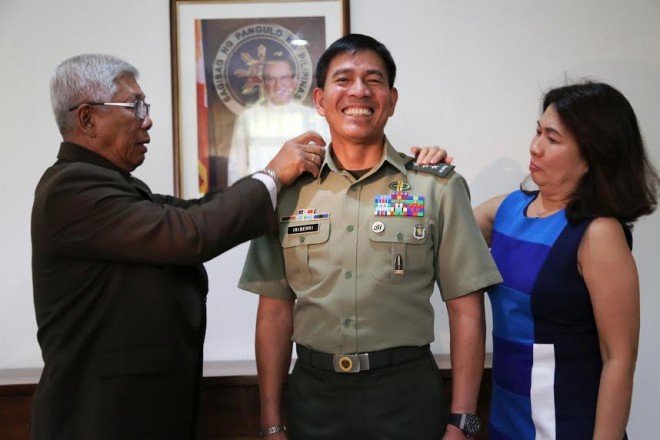Iriberri declares military ‘gender-free’ institution

AFP Chief of Staff Gen. Hernando DCA Iriberri/OFFICE OF THE ARMY CHIEF PUBLIC AFFAIRS
The 125,000-strong Armed Forces of the Philippines is no longer a “gendered institution” and now provides equal opportunities to female soldiers and even members of the LGBTQ (lesbian, gay, bisexual, transgender and queer) community to succeed as soldiers.
AFP Chief of Staff Gen. Hernando Iriberri told the Inquirer that gender mainstreaming had put emphasis on the soldiers’ capability to prove their worth in combat and non-combat roles, regardless of gender.
He said the military institution, once a male domain, respected and advocated gender equality in the organization, particularly in terms of rights, responsibilities, opportunities, conditions and treatment.
“We do not judge our soldiers on the basis of their gender but rather, we give importance to their accomplishments, competencies and work ethic,” Iriberri said.
Since the enactment of Republic Act No. 7192, “An Act Promoting the Integration of Women as Full and Equal Partners of Men in Development and Nation-Building And For Other Purposes,” the AFP has accommodated women in its ranks with the entry of female cadets in the Philippine Military Academy in 1993 initially with a quota of 30, Irriberi said.
Article continues after this advertisementSection 15 of the act provides that “the state shall pursue appropriate measures to eliminate discrimination of women in the military, police and other similar services, including revising or abolishing policies and practices that restrict women from availing of both combat, security-related or field operations.”
Article continues after this advertisementAFP data showed that as of October 2013, there were 1,879 female soldiers in the Philippine Army, 527 of them officers and 1,351 enlisted women.
Iriberri said the AFP had accommodated women in its ranks, with the female cadets initially given a quota of 18 percent.
Since 1993, female PMA cadets have since graduated with the classes of 1997, 1998, 1999 and 2000. Arlene de la Cruz, a graduate of Class ’99, holds the distinction of being the first female cadet to graduate at the top of her class.
Iriberri said female cadets undergo basically the same rigid training as their male counterparts to become future officers of the AFP. Likewise, punishment is served equally regardless of gender.
But while the AFP respects gender roles, Iriberri said that cross-dressing or public displays of conduct demeaning to the profession of arms was strictly prohibited.
Of the three major services of the AFP, it is in the Philippine Army and the Marine Corps that women’s engagement in combat is scarce, if not discouraged.
Elite fighting units such as the Scout Rangers, Special Forces, Navy Seals and Marines are usually deployed to fight the communist and Muslim insurgencies and other lawless elements, such as the Abu Sayyaf and the Bangsamoro Islamic Freedom Fighters.
In general, military doctrines, strategies and facilities are all designed for men. The profession of arms was never intended for women when it was first conceived until feminization swept most armed forces of other countries.
In asserting gender equality in the Philippine military, the late AFP Chief of Staff Gen. Arturo Enrile said there should be no issue when it came to soldiers performing their role as protector of the people and the Constitution.
In the book “A Soldier’s Legacy,” which was a tribute to Enrile’s accomplishments as a soldier, the latter said that “bickering and hair-splitting are just a way of clearing the air.”
“For at heart, we are patient, helpful and nurturing people and in times of crisis, we join hands for a common struggle,” Enrile.